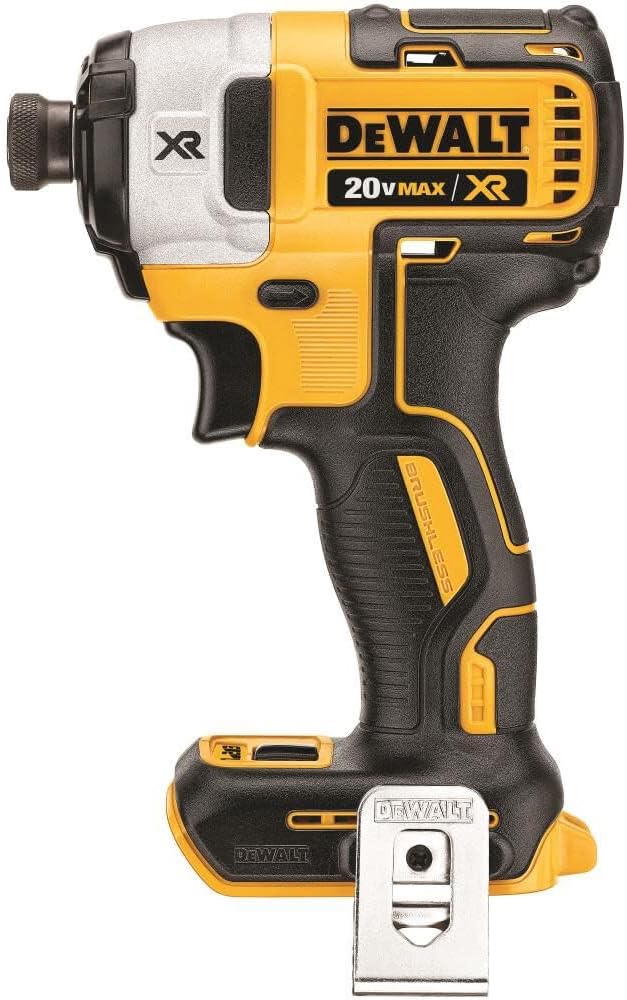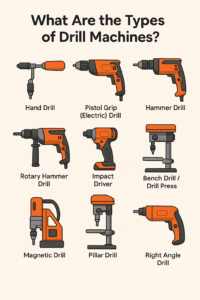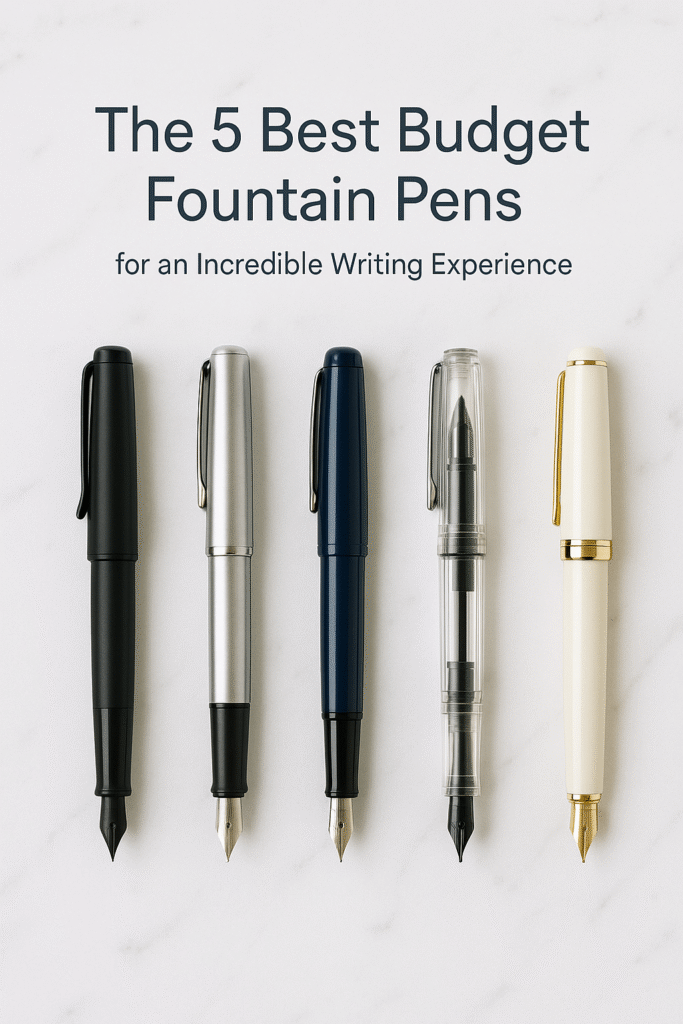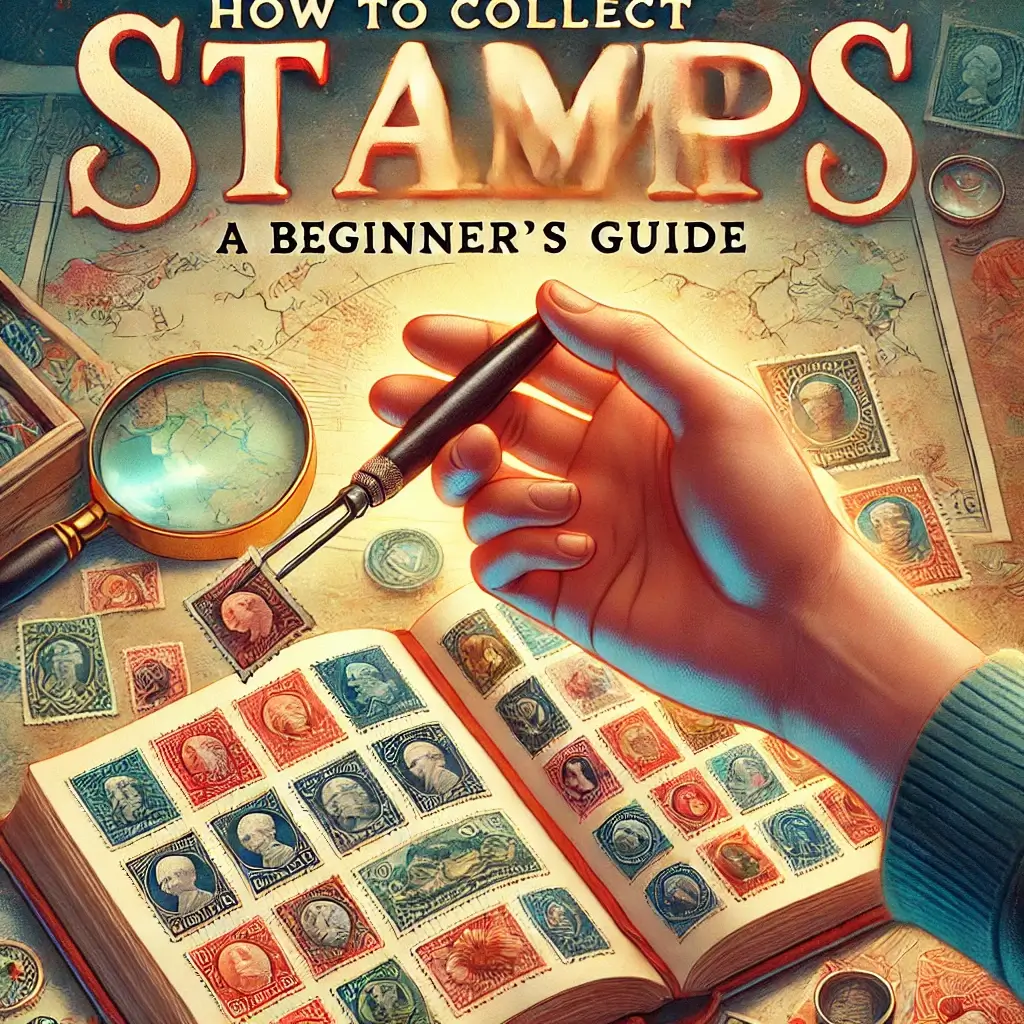What Are the Various Types of Drill Machines and Their Uses?
The word “drill” is simple, but the world of drills is anything but. Step into any tool aisle, and you’re confronted with a dizzying array of options that all seem to do the same thing, yet have wildly different names, shapes, and prices. Using the wrong tool for the job is a recipe for frustration—it’s like trying to chop an onion with a butter knife. It might eventually work, but the results will be messy, and the process will be painful.
That’s where this guide comes in. We’re here to be your expert translator, turning confusing tool-speak into plain English. We’ll break down every major type of drill machine, explain what makes each one unique, and pinpoint exactly what kinds of tasks it was built to dominate.
Whether you’re a new homeowner looking to buy your first power tool or a seasoned pro considering an upgrade, understanding these distinctions is the key to working smarter, faster, and achieving cleaner, more professional results. Let’s drill down into the details.
1. The Everyday All-Rounder: The Drill/Driver
If you only own one drill, this is it. The drill/driver is the undisputed jack-of-all-trades and the most common type of power drill you’ll find in homes across the U.S. It’s designed to be a versatile workhorse, capable of handling the two most fundamental tasks in any project: drilling holes and driving screws.
Key Features
- Adjustable Clutch: This is the numbered collar behind the chuck. It allows you to control the amount of torque, preventing you from stripping screw heads or sinking them too deep into your material.
- Two-Speed Gearbox: A selector switch on top lets you choose between low speed/high torque (for driving screws) and high speed/low torque (for drilling holes).
- Adjustable Chuck: This is the part that grips the bit. Most modern drills have a keyless chuck that you can tighten by hand, typically in a 3/8-inch or 1/2-inch size for heavier-duty models.
Best Uses
Perfect for assembling furniture, hanging shelves and pictures, installing cabinet hardware, drilling pilot holes in wood, drywall, and plastic, and a thousand other light-to-medium-duty tasks around the house.

Classic Example: DEWALT 20V MAX Cordless Drill / Driver Kit (DCD771C2)
This drill is a staple in garages and on job sites everywhere for a reason. It perfectly embodies the drill/driver concept: it’s powerful enough for most DIY tasks, features a reliable 1/2-inch chuck and a two-speed transmission, and is ergonomically designed for comfortable use. For a beginner or homeowner, this kit is the ideal starting point.
Power: 20V MAX
Chuck Size: 1/2-Inch Keyless
Perfect For: General home repairs, DIY projects, and woodworking.
2. The High-Torque Specialist: The Impact Driver
An impact driver is the drill/driver’s powerful, specialized cousin. While it may look similar, it operates in a completely different way. It is a master of one thing: driving fasteners with extreme prejudice. It combines rotation with powerful concussive impacts (hitting from the direction of rotation), which generates immense torque.
Key Features
- Rotational Impacts: This is its superpower. It delivers thousands of “impacts per minute” (IPM), allowing it to drive long screws and lag bolts with minimal effort from the user and almost zero chance of stripping the head.
- High Torque: Impact drivers have significantly more torque than drill/drivers, making them ideal for heavy-duty fastening.
- 1/4-Inch Hex Collet: Instead of an adjustable chuck, it has a quick-release collet that accepts 1/4-inch hex-shank driver bits. This means it’s not designed for standard round-shank drill bits.
Best Uses
Building decks, framing walls, driving long structural screws (like lag bolts), and any repetitive fastening job. If you have to drive dozens or hundreds of screws, an impact driver will save your wrist and get the job done in a fraction of the time.

Classic Example: DEWALT 20V MAX XR Brushless Impact Driver (DCF887B)
This tool is a beast in a compact package. The brushless motor provides incredible power and runtime, delivering up to 1,825 in-lbs of torque. It features a 3-speed setting for added control, including a “Precision Drive” mode for delicate tasks. Once you use an impact driver for a big project, you’ll never go back to a regular drill for driving screws.
Power: 20V MAX (Brushless)
Torque: 1,825 in-lbs
Perfect For: Deck building, construction, heavy-duty fastening.
3. The Masonry Master: The Hammer Drill
What happens when you need to drill a hole in something harder than wood or metal, like a brick wall or a concrete slab? A regular drill will just spin helplessly. For this job, you need the brute force of a hammer drill.
Key Features
- Hammering Mechanism: In addition to spinning, a hammer drill produces a rapid, high-frequency forward-and-back hammering action. This is measured in “blows per minute” (BPM)—often over 30,000 BPM. This pulverizing action chips away at the masonry, allowing the bit to bore through.
- Drill-Only Mode: Crucially, all hammer drills have a selector switch that lets you turn the hammering function off. This allows it to function as a standard (though typically heavier and larger) drill/driver for wood and metal.
Best Uses
Drilling into concrete, brick, stone, block, and other masonry. It’s essential for tasks like installing anchors for shelving in a basement foundation, mounting a hose reel to a brick facade, or any renovation involving masonry.

Classic Example: DEWALT 20V MAX XR Brushless Hammer Drill (DCD996B)
This tool represents the peak of cordless versatility. It’s a high-performance drill/driver with a powerful brushless motor, a durable 1/2-inch metal chuck, and a 3-speed transmission. But with the flip of a switch, it engages a powerful hammer mechanism capable of 38,250 BPM, allowing you to tackle concrete and brick with ease. It’s a true 3-in-1 solution.
Power: 20V MAX (Brushless)
BPM: 38,250
Perfect For: General construction, remodeling, drilling in any material.
4. The Heavy-Duty Brute: The Rotary Hammer
If a hammer drill is a boxer delivering a flurry of fast jabs, a rotary hammer is a heavyweight delivering powerful knockout blows. It’s a professional-grade tool designed for day-in, day-out work on dense concrete.
Key Features
- Electro-Pneumatic Hammering: Instead of mechanical discs, it uses a piston mechanism to create a much more powerful, lower-frequency impact. The force is measured in Joules.
- SDS Chuck: It uses a special “Slotted Drive System” chuck and bits. SDS bits lock into the chuck, preventing any slippage during intense hammering.
- Multiple Modes: Most rotary hammers have three modes: drill only, hammer drill, and a “chisel-only” mode that stops rotation entirely for light demolition work like removing tiles.
Best Uses
Drilling large-diameter holes for rebar or anchors in solid concrete, chipping away concrete, removing tiles, and light demolition. It is overkill for virtually all homeowner tasks but indispensable for professionals.

Classic Example: Bosch 11255VSR Bulldog Xtreme Rotary Hammer
The “Bulldog” is a legendary tool on construction sites. This corded model provides unrelenting power with its 7.5-Amp motor, delivering 2.0 ft-lbs of impact energy. Its D-handle provides optimal control, and the SDS-plus chuck system allows for tool-free, secure bit changes. For serious concrete work, this is the industry standard.
Power: 7.5 Amps
Impact Energy: 2.0 ft-lbs
Perfect For: Professional concrete drilling, chipping, and demolition.
5. The Workshop Staple: The Drill Press
All the drills we’ve discussed so far are handheld. The drill press is different. It’s a stationary tool that offers unparalleled precision and power for workshop tasks.
Key Features
- Precision and Accuracy: Because the motor and chuck are mounted on a fixed column, a drill press drills perfectly straight, 90-degree holes every single time.
- Depth Control: An adjustable depth stop lets you drill holes to a precise, repeatable depth—impossible to do by hand.
- Leverage: A large feed handle gives you mechanical advantage, allowing you to apply much more force and drill through thick, hard materials with ease.
Best Uses
Fine woodworking, metalworking, and any task that demands perfectly straight holes of a consistent depth. It’s ideal for creating mortises, drilling pen blanks, or any precision fabrication.
Which Drill Do You Actually Need?
Feeling overwhelmed? Let’s simplify. For 90% of homeowners, a good cordless drill/driver is the perfect starting point. As your projects get more ambitious (like building a deck), add an impact driver to your collection. If your house has a brick exterior or a concrete basement, you absolutely need a hammer drill. The other types are for more specialized, professional, or workshop-based tasks.
A big part of the decision is also power source. Check out our guide on which is better: corded or cordless drill to help you decide. Ready to buy? See our top picks for the best cordless drills and best corded drills.
Frequently Asked Questions
What is the most common type of drill?
The most common type is the drill/driver. Its versatility in both drilling holes and driving screws makes it the essential, all-purpose power tool for nearly every homeowner and DIYer.
What is the difference between an impact driver and a drill?
A drill applies continuous rotational force, which is good for drilling clean holes. An impact driver adds powerful, concussive rotational blows to the turning action, generating much more torque for driving screws, especially long or large ones, without stripping the head.
Can I use a regular drill for concrete?
No. You should never use a regular drill/driver for concrete. It lacks the necessary hammering action and attempting to do so will, at best, make no progress and, at worst, overheat and destroy your drill’s motor. You must use a hammer drill or a rotary hammer.
What is a drill press used for?
A drill press is a stationary workshop tool used for drilling highly accurate and repeatable holes. Its primary advantages are drilling perfectly straight (90-degree) holes and controlling the depth of the hole precisely, which is crucial for woodworking and metalworking.
Conclusion: The Right Tool for the Right Task
There is no single “best” drill—only the best drill for the job at hand. By understanding the unique strengths of each type of drill machine, you can move beyond a one-size-fits-all approach and equip yourself with the right tools to work more efficiently, achieve better results, and tackle projects with greater confidence.
Now that you can identify the perfect tool for your needs, the next step is to master its operation. For a complete guide to safe and effective use, read our tutorial on how to use a drill machine for home improvement.


